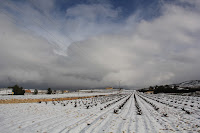Staying home and keeping warm

It's been a bit miserable for days, nay weeks, now. Tumble dryer rather than washing line, slightly moist bath towels. Dirty boot prints across the kitchen floor. I've been looking for something to do. What about popping up north for the weekend? I don't know why but I thought about Huesca or maybe Sigúenza. Some travel website says I'm talking about five or six hours. Well, if we set off after I finish work on Friday evening we could still be there for a nightcap around midnight. Paradors, Paradores, choose your plural, the upmarket hotel chain, constantly promote their offers. I had a bit of a look. None of it quite fits. Maybe it would work. Why not? Well, the truth is, it looks a bit dear actually. Madrid maybe, Madrid is always good. It always makes me feel less like a yokel when I'm in an art gallery and I'm not the only person there. That's not exactly free either and the deals on the super fast trains don't seem to be quite as stupendous and ub...



